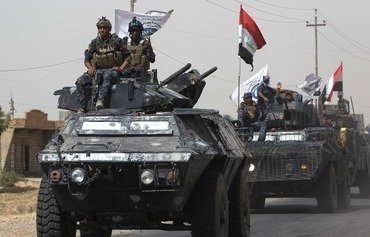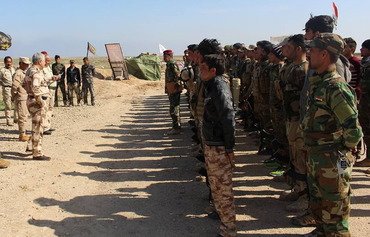Iraq brought all of its territory still held by the "Islamic State of Iraq and Syria" (ISIS) under attack Thursday (September 20th), throwing the group on the defensive across their self-proclaimed "caliphate" extending into neighbouring Syria.
Iraqi security forces launched a dawn assault on a besieged ISIS-held pocket around the northern town of al-Hawija, in Kirkuk province, just days after attacking the group's only other foothold in the country, AFP reported.
The territory still held by ISIS has been dwindling fast since its defeat in Mosul in July, with stronghold after stronghold coming under assault on both sides of the border with Syria.
Iraqi Prime Minister Haider al-Abbadi predicted that the assault on the al-Hawija region would swiftly bring a new victory against the crumbling group.
After the defeat of ISIS in Mosul and the recapture of adjacent areas, al-Hawija and neighbouring towns form the last enclave still held by ISIS in Iraq apart from a section of the Euphrates Valley downstream from the border with Syria.
"At the dawn of a new day, we announce the launch of the first stage of the liberation of al-Hawija, in accordance with our commitment to our people to liberate all Iraqi territory and eradicate ISIS's terrorist groups," al-Abbadi said.
"Greetings to all of our forces, who are waging several battles of liberation at the same time and who are winning victory after victory and this will be another, with the help of God," he said.
Tribal forces participate in battle
The first stage of the battle will focus on retaking the eastern part of the city of al-Sharqat to the north-west of al-Hawija, Iraqi officials told Diyaruna.
Joint forces from the Iraqi security forces, rapid response and federal police, are taking part in the battle.
Iraqi forces launched the battle after completing deployment and preparations for pushing into the area over the past few days, said eastern al-Sharqat district director Wasmi al-Sohn.
"About a thousand fighters from al-Sharqat tribes and other local forces are taking part in the battle," he told Diyaruna.
Military forces, with air support from the Iraqi air force and international coalition warplanes, have succeeded in destroying ISIS's defensive lines and fortifications, he said.
They have liberated in the first few hours of the battle six villages, including Kawa, Cysbana, Hasarouk, Upper Shandar, Hoshtar and Laluk, said Joint Command spokesman Brig. Gen. Yahya Rasul.
Twenty five ISIS elements have been killed so far, he told Diyaruna.
ISIS elements surrender
"ISIS is collapsing, and in the days leading to the start of the battle, dozens of the group's elements have surrendered," al-Sohn said.
They pushed their families to leave for the western side of al-Sharqat, which is under Iraqi forces control, he said, while they surrendered to the Peshmerga forces stationed near the northern and eastern parts of al-Hawija.
Al-Sohn said that most of eastern al-Sharqat residents had fled long before the battle began.
"Hundreds of families were fleeing every day, and in recent days that number has gone down to no more than six or seven families per day," he said.
"Security forces place the safety of trapped civilians at the top of their priorities," he said.
Concern for civilians
Humanitarian organisations expressed concern for the fate of civilians caught up in the offensive.
"The 85,000 civilians still in and around al-Hawija, including around 40,000 children, now face a terrifying time as they worry about getting caught up in the fighting or being hit by an airstrike," said International Rescue Committee acting country director Jason Kajer.
"For those who decide to flee, there is a significant risk of being targeted by ISIS snipers or killed by a mine," he said.
ISIS has seen the territory under its control fast diminish in recent months in the face of multiple offensives against its fighters in both Iraq and Syria.
On Tuesday, Iraqi forces launched an attack up the Euphrates Valley against the other one of ISIS's two remaining enclaves in Iraq.
And in Syria's eastern province of Deir Ezzor, ISIS faces twin assaults -- one by government troops and the other by fighters of the Syrian Democratic Forces.
Further up the Euphrates, the SDF now controls 90% of the city of al-Raqa, the Syrian Observatory for Human Rights said on Wednesday.

![Iraqi federal police forces are deployed near al-Hawija to take part in the battle to liberate the Kirkuk province city from the 'Islamic State of Iraq and Syria'. [Photo from the Iraqi Federal Police Facebook page]](/cnmi_di/images/2017/09/21/9706-hawijah-liberation-iraq-600_384.jpg)





